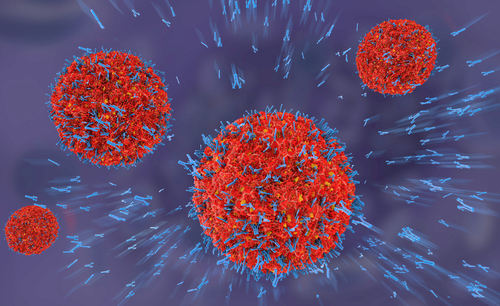Compass Therapeutics‘ CTX-2026, an antibody targeting the protein BTN3A1, could be therapeutic in ovarian cancer by helping the immune system destroy cancer cells, preclinical data show.
The study, “BTN3A1 governs antitumor responses by coordinating αβ and γδ T cells,” was published in the journal Science.
The body’s immune system is responsible for fighting off infections and killing unhealthy cells, including cancer cells. Fundamentally, the immune system must be able to recognize and attack infected or cancerous cells while at the same time not attacking healthy cells.
One of the strategies that has evolved to manage this dichotomy is immune checkpoints. Conceptually, checkpoints are biochemical systems for healthy cells to signal to immune cells that they are healthy and should not be destroyed. One of the best-studied checkpoint systems involves the protein PD-1.
Cancer cells will often co-opt immune checkpoints to avoid being destroyed by the immune system. As such, therapies that block these checkpoints — such as PD-1 inhibitors — have shown great benefits in the treatment of cancer, since they allow the immune system to more effectively kill cancer cells.
Immune checkpoint inhibitors have shown promise in certain cancer types (e.g., lung cancer and melanoma), but responses in other cancer types, including ovarian cancer, have generally been lackluster. One possible explanation for this discrepancy is that different checkpoint systems may be preferentially used by different cancer types.
In the new study, researchers from Compass Therapeutics, Moffitt Cancer Center, and The Wistar Institute evaluated a checkpoint system involving the protein BTN3A1. Previous research had indicated that BTN3A1 had immune-regulating functions.
The researchers first analyzed 440 ovarian cancer samples, and found that malignant cancers tended to express BTN3A1 at much higher levels than benign tumors. In the context of cancer, “benign” tumors are non-cancerous and do not spread to nearby tissues or other regions of the body.
High BTN3A1 levels were also found in some samples of malignant breast cancer, indicating that high levels of this molecule can be found in multiple types of aggressive cancer.
The researchers determined that BTN3A1 inhibits the activity of T-cells, a type of immune cell that is centrally involved in anti-tumor immune responses. More specifically, through a battery of biochemical assays, they demonstrated that BTN3A1 directly interacts with CD45.
CD45 is a protein that plays a critical role in the molecular signaling that activates T-cells, triggering them to grow, secrete inflammatory proteins, and ultimately kill cancer cells. BTN3A1 was found to prevent normal CD45 signaling, thereby preventing T-cell activation.
The researchers developed several antibodies designed to block the activity of BTN3A1, and found the most effective to be CTX-2026. This antibody specifically targets a version of the BTN3A1 protein called CD277.
To evaluate the therapeutic potential of CTX-2026, an ovarian cancer mouse model was infused with cancer-specific T-cells, with or without CTX-2026 treatment.
Tumor growth was significantly slowed in mice treated with CTX-2026. Notably, the anti-tumor effect of CTX-2026 was more potent than that of Opdivo (nivolumab), a PD-1 inhibitor, in this mouse model.
“I am encouraged by these data,” Thomas Schuetz, MD, PhD, co-founder and CEO at Compass Therapeutics, said in a press release, “which not only suggest that BTN3A1 may play an important role in ovarian cancer but also demonstrate that CTX-2026 binding to BTN3A1 overcame the immunosuppressive microenvironment of ovarian cancer and delayed malignant progression in preclinical tumor models.”
Another notable finding concerns the specific type of T-cells involved. Most checkpoint inhibitor research has focused on a subset of T-cells called alpha beta (αβ) T-cells, which are generally thought to be the primary drivers of anti-tumor immunity.
However, in the mouse experiments, optimum results were only achieved when CTX-2026 was combined with both αβ T-cells and another T-cell subset, gamma delta (γδ) T-cells.
“We report that targeting BTN3A1 with certain human antibodies is sufficient to elicit coordinated αβ and γδ T cell antitumor responses against established tumors, and we have demonstrated that BTN3A1 targeting in validated … models of ovarian cancer is superior to PD-1 checkpoint therapy,” the researchers wrote.
“Targeting BTN3A1 … may present a treatment strategy for tumors resistant to existing immunotherapies,” they added.

